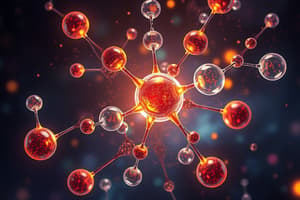Podcast
Questions and Answers
Why do organic compounds generally not give ionic reactions?
Why do organic compounds generally not give ionic reactions?
- They contain only non-metallic elements
- They have high ionization energy
- They are generally covalent compounds (correct)
- They lack electronegativity
What makes organic molecules structurally more complex?
What makes organic molecules structurally more complex?
- They lack electronegativity
- They have high ionization energy
- They are usually large (correct)
- They contain only non-metallic elements
What is a common phenomenon in organic compounds where different compounds have the same molecular formula but different structural formulas?
What is a common phenomenon in organic compounds where different compounds have the same molecular formula but different structural formulas?
- Ionic bonding
- Electronegative behavior
- Isomerism (correct)
- Homologous series
What is a common phenomenon in organic compounds where different compounds have the same molecular formula but different structural formulas?
What is a common phenomenon in organic compounds where different compounds have the same molecular formula but different structural formulas?
Why are most organic compounds insoluble in water and dissolve readily in non-polar organic solvents?
Why are most organic compounds insoluble in water and dissolve readily in non-polar organic solvents?
What characteristic of organic compounds contributes to the slow rate of organic reactions?
What characteristic of organic compounds contributes to the slow rate of organic reactions?
What exemplifies the close relationship between different organic compounds and has reduced the study of millions of compounds to only a few series?
What exemplifies the close relationship between different organic compounds and has reduced the study of millions of compounds to only a few series?
Why are most organic compounds insoluble in water?
Why are most organic compounds insoluble in water?
What contributes to the slow rate of organic reactions?
What contributes to the slow rate of organic reactions?
What exemplifies the close relationship between different organic compounds?
What exemplifies the close relationship between different organic compounds?
Why do organic compounds generally not give ionic reactions?
Why do organic compounds generally not give ionic reactions?
Match the following characteristics of organic compounds with their descriptions:
Match the following characteristics of organic compounds with their descriptions:
Match the following characteristics of organic compounds with their properties:
Match the following characteristics of organic compounds with their properties:
Match the following properties of organic compounds with their descriptions:
Match the following properties of organic compounds with their descriptions:
Match the following characteristics of organic compounds with their examples:
Match the following characteristics of organic compounds with their examples:
What is isomerism and why is it a common phenomenon in organic compounds?
What is isomerism and why is it a common phenomenon in organic compounds?
Explain the complexity of organic compounds and provide an example to illustrate it.
Explain the complexity of organic compounds and provide an example to illustrate it.
Why do organic compounds generally not give ionic reactions?
Why do organic compounds generally not give ionic reactions?
What are the typical solubility properties of organic compounds?
What are the typical solubility properties of organic compounds?
Explain the concept of isomerism in organic compounds and provide an example to illustrate it.
Explain the concept of isomerism in organic compounds and provide an example to illustrate it.
Why are organic compounds generally covalent and do not give ionic reactions?
Why are organic compounds generally covalent and do not give ionic reactions?
Describe the solubility properties of organic compounds and explain why they are generally insoluble in water but dissolve readily in non-polar organic solvents.
Describe the solubility properties of organic compounds and explain why they are generally insoluble in water but dissolve readily in non-polar organic solvents.
What contributes to the structural complexity of organic molecules and provide an example to illustrate this complexity?
What contributes to the structural complexity of organic molecules and provide an example to illustrate this complexity?
Flashcards are hidden until you start studying




